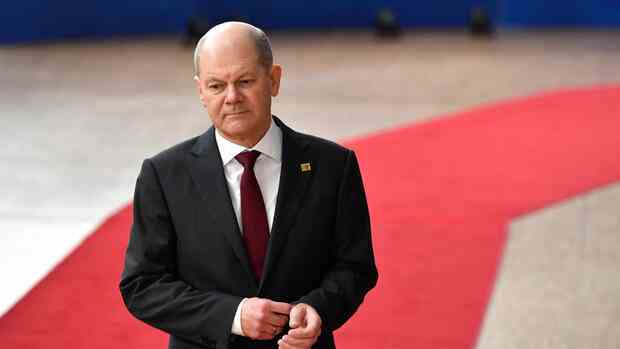Brussels Roberta Metsola gets straight to the point. The President of the European Parliament told Swedish Prime Minister Ulf Kristersson that she was writing to express her “deep concern” about the postponement of the vote on important climate protection measures. The delay “risks undermining the credibility of the legislative process at EU level” and upsetting the “institutional balance of the European Union,” warns Metsola in a letter seen by Handelsblatt.
Sweden currently holds the EU Council Presidency, and Kristersson is responsible for the EU agenda. But the actual addressee of Metsola’s warnings is someone else – Chancellor Olaf Scholz. Because it is the dispute within the German coalition that is preventing the adoption of climate protection measures. The FDP has again called into question the long-agreed compromise on the end of combustion engines – and is thus holding up the entire EU climate package.
Scholz, however, apparently does not think about speaking a word of power. At the start of the EU summit in Brussels, he expressed his distance: “If I understand the talks between the Commission and the federal government correctly, as far as the responsible commissioner and the responsible minister are concerned, everything is on the right track,” said Scholz.
This refers to the Vice President of the EU Commission Frans Timmermans and Federal Transport Minister Volker Wissing (FDP), whose offices are currently negotiating the details of how cars with internal combustion engines should be approved after 2035. The law should not be touched, which had the goal that the last diesel and petrol cars will be sold in 2034.
But the pressure on Scholz to clarify the matter is growing. For example, Latvia’s Prime Minister Krisjanis Karins said the entire architecture of European decision-making would fall apart if everyone behaved like Germany.
The leader of the Greens in the Bundestag, Britta Hasselmann, called for a clear position from Scholz at the EU summit. He must make it clear that you can rely on Germany. Her colleague in the European Parliament, Terry Reintke, said: “It is becoming increasingly difficult to explain to our European partners why Chancellor Scholz is not showing any leadership on this issue.”
A good three weeks ago, the FDP surprisingly blocked the legally binding agreement on the law to phase out combustion engines, although it had supported the relevant decisions in the federal government on several occasions. Germany’s sudden turnaround was met with incomprehension in the EU Commission, parliamentarians and representatives of other EU governments, since negotiations on the law had long been concluded.
Austria’s Chancellor on the side of the FDP
In Brussels, Scholz clearly followed the line of argument of the FDP: During the negotiations, the EU Commission had made a commitment to a regulation according to which pure e-fuel vehicles can also be approved after 2035. Now it’s just a matter of how this promise is implemented pragmatically. He received support from Austria’s Chancellor Karl Nehammer.
>> Read here: EU Column – Germany is jeopardizing the world’s most important climate protection package
Others read the promise in such a way that it is only about special vehicles such as ambulances. In the meantime, however, the Commission has made proposals to create an exception rule for all vehicles that can only be driven with e-fuels.
E-fuels are fuels that are usually made from hydrogen and CO2. Their production consumes a lot of electricity. If this comes from renewable sources, they are carbon neutral.
Scholz: “We will also have to deal with the competitiveness of the EU”
Without Germany, there would not be a sufficient majority for phasing out combustion engines at EU level, because at least Poland, Bulgaria and Italy are against it. The end of combustion engines is actually not on the agenda for the summit. Nevertheless, he hopes that there will be an agreement on the sidelines of the meeting or soon after, said Prime Minister of the Netherlands, Mark Rutte.
Macron wants nuclear power support
Before the meeting, Paris said that President Emmanuel Macron would defend the end of combustion engines in Brussels. Macron himself is under pressure to bring home a win. Large-scale strikes against his pension reform paralyzed the country for days.
He is concerned with breaking down the resistance to nuclear power and thus achieving better funding conditions, although this topic is not officially on the agenda either. France wants to modernize and supplement its power plants. French nuclear companies also offer their services in other EU countries.
>> Read here: Macron’s government survives vote of no confidence – but protests against pension reform continue
Recently, however, there was a setback for the technology at EU level: the EU Commission did not list nuclear power as an eligible technology when it presented its proposal for a “Net Zero Industry Act”. Many billions are to flow into wind, sun, batteries and hydrogen in the coming years – but not into nuclear power.
Member States can make changes, just like Parliament. And France will do a lot to get nuclear power on the list.
More: That’s what the argument about e-fuels is about
